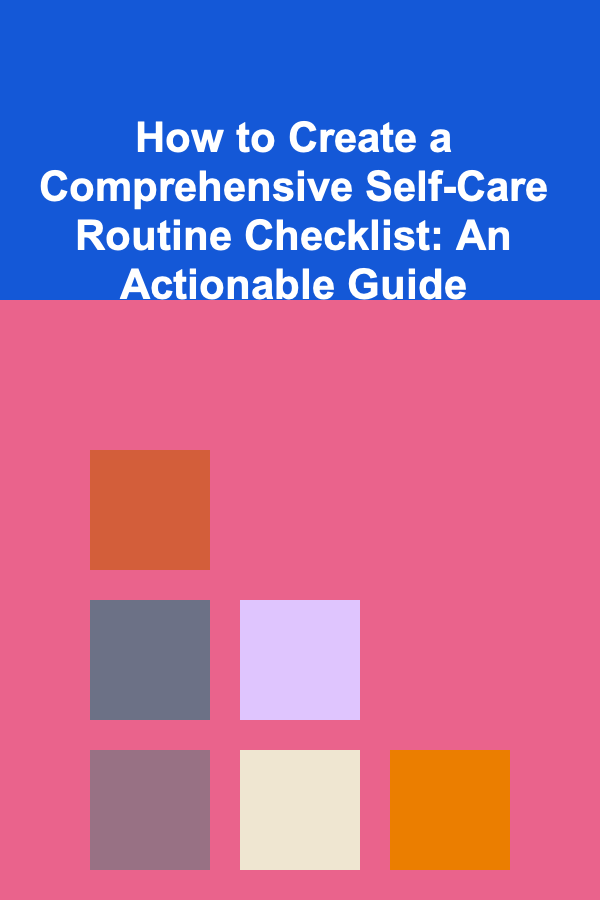
How to Create a Comprehensive Self-Care Routine Checklist: An Actionable Guide
ebook include PDF & Audio bundle (Micro Guide)
$12.99$7.99
Limited Time Offer! Order within the next:

In today's fast-paced world, self-care is more important than ever. It's not just about indulging in a spa day or taking a bubble bath; true self-care is about creating habits that nurture your body, mind, and spirit consistently. Building a self-care routine is essential for managing stress, improving mental health, and achieving a sense of balance in your life.
This comprehensive guide will take you through the process of creating a self-care routine checklist that fits your lifestyle, addresses your needs, and helps you maintain well-being every day.
Understanding the Importance of Self-Care
Self-care is about making time for activities that recharge and replenish you. It is a necessary practice to avoid burnout, improve productivity, and create a strong foundation for overall health. Prioritizing self-care helps reduce stress, anxiety, and physical fatigue while increasing focus, creativity, and emotional stability.
In its most fundamental form, self-care involves treating yourself with the same kindness and consideration you would offer to others. However, self-care is not one-size-fits-all---it's a personalized approach that considers your unique needs, lifestyle, and goals.
Creating Your Self-Care Routine Checklist
A self-care checklist helps you stay consistent and mindful about taking care of yourself, providing structure to your routine. Here's how to create a comprehensive self-care checklist that covers all aspects of well-being.
Step 1: Identify the Key Areas of Self-Care
Self-care is more than just physical health; it encompasses multiple areas that contribute to your overall well-being. The key areas of self-care typically include:
- Physical Self-Care: Maintaining your body's health and vitality through activities that promote physical well-being.
- Mental Self-Care: Taking actions that stimulate and relax your mind, reduce stress, and enhance your cognitive functioning.
- Emotional Self-Care: Practices that help you process and manage your emotions, such as building healthy relationships or seeking therapy.
- Social Self-Care: Staying connected to loved ones and engaging in meaningful social activities.
- Spiritual Self-Care: Cultivating a sense of purpose, mindfulness, and inner peace.
- Environmental Self-Care: Creating a harmonious space around you that supports relaxation and productivity.
Each of these areas plays a critical role in supporting your health and well-being. In your checklist, make sure to include practices from each category to ensure you have a well-rounded approach to self-care.
Step 2: Assess Your Current Self-Care Habits
Take a moment to evaluate your current self-care practices. Are you neglecting any of these key areas? Which habits do you already have in place, and where could you improve?
Start by asking yourself these questions:
- Physical: Am I getting enough sleep? Am I eating well? Do I engage in regular physical exercise?
- Mental: How do I manage stress? Do I practice mindfulness or meditation? Am I taking time to rest my mind from work or constant stimulation?
- Emotional: How well do I process my emotions? Do I have a support system? Am I practicing self-compassion?
- Social: Am I maintaining relationships with friends and family? Do I set aside time for social activities?
- Spiritual: Do I have a spiritual practice or source of meaning in my life? Do I take time to reflect on my personal values?
- Environmental: Does my environment make me feel calm and productive? Is my living space cluttered, or is it conducive to relaxation?
This self-assessment will help you identify gaps in your routine and determine what areas need the most attention.
Step 3: Set Realistic Self-Care Goals
Once you've assessed your current habits, set clear and realistic goals for each area of self-care. The key is to create goals that are specific, measurable, achievable, relevant, and time-bound (SMART). Here's an example of how to set goals for each area:
- Physical: "I will aim for 7-8 hours of sleep every night to feel more rested."
- Mental: "I will practice mindfulness meditation for 10 minutes each morning to reduce stress."
- Emotional: "I will talk to a therapist once a month to process my emotions."
- Social: "I will call or meet with a friend once a week to strengthen my social connections."
- Spiritual: "I will spend 15 minutes each evening journaling to reflect on my values and sense of purpose."
- Environmental: "I will declutter my home office by the end of the month to create a peaceful workspace."
Make sure these goals are tailored to your current life circumstances and abilities. Don't overcommit yourself---start small and build up from there.
Step 4: Develop Your Daily, Weekly, and Monthly Checklist
Once you have set your goals, create a detailed self-care checklist for different time frames: daily, weekly, and monthly. Having a structured routine will help you stay organized and intentional about your self-care.
Daily Self-Care Checklist
Daily self-care is about forming habits that you can easily incorporate into your everyday life. Here are some actions to consider adding to your daily checklist:
-
Physical:
- Drink enough water (aim for at least 8 cups).
- Eat a balanced meal (vegetables, fruits, proteins, healthy fats).
- Engage in physical activity (e.g., a 20-minute walk or a 30-minute workout).
- Practice good hygiene (shower, brush teeth, skincare routine).
- Get 7-8 hours of sleep.
-
Mental:
- Practice mindfulness or meditation for 5-10 minutes.
- Take short breaks during work to reset your mind.
- Avoid excessive screen time before bed.
-
Emotional:
- Acknowledge your feelings and check in with yourself.
- Practice positive affirmations or self-compassionate thoughts.
- Engage in activities that make you feel good (reading, journaling).
-
Social:
- Reach out to a friend or family member via text, call, or in person.
-
Spiritual:
- Spend a few minutes in reflection, gratitude, or prayer.
-
Environmental:
- Keep your living or working space tidy.
- Open windows for fresh air.
Weekly Self-Care Checklist
A weekly checklist includes practices that may not need to be done every day but are still important for your overall well-being.
-
Physical:
- Take a longer workout or engage in a more intense physical activity.
- Prep meals for the week to ensure healthy eating.
-
Mental:
- Read a book, take an online course, or engage in a mentally stimulating activity.
- Set aside time for a hobby you enjoy.
-
Emotional:
- Have a conversation with a trusted friend or partner to discuss your emotions.
- Do something creative like painting, writing, or crafting to express yourself.
-
Social:
- Attend a social event or meet up with friends or family.
-
Spiritual:
- Spend time in nature or engage in a spiritual activity (e.g., attending a church service, visiting a temple, or spending time with a community).
-
Environmental:
- Do a weekly cleaning or organization of your living space.
Monthly Self-Care Checklist
The monthly checklist allows for deeper activities that require more time or reflection.
-
Physical:
- Get a check-up or schedule a medical appointment if necessary.
- Schedule time for a longer physical activity, such as hiking, yoga retreat, or spa visit.
-
Mental:
- Reflect on your mental health progress and make adjustments if needed.
- Set new personal growth or learning goals for the upcoming month.
-
Emotional:
- Journal or reflect on your emotional journey over the last month.
- Take time to do a digital detox.
-
Social:
- Plan a gathering or weekend trip with friends or family.
-
Spiritual:
- Evaluate your spiritual journey and consider any adjustments you want to make.
- Take a weekend to focus on deepening your spiritual practice.
-
Environmental:
- Declutter your home or workspace.
- Do a thorough cleaning or redecorate to refresh your environment.
Step 5: Consistency and Adaptation
The key to a successful self-care routine is consistency. Start by following your checklist for a few weeks and track your progress. However, be adaptable---life circumstances change, and so will your needs. If you find certain activities no longer serve you, don't be afraid to switch them out for others that better fit your evolving needs.
Regularly revisit your checklist, tweak goals, and be kind to yourself if things don't always go as planned. Self-care is about building healthy habits, not perfection.
Conclusion
A comprehensive self-care routine checklist is a powerful tool to help you prioritize your health and well-being. By addressing all the key areas of self-care---physical, mental, emotional, social, spiritual, and environmental---you create a balanced, holistic approach to taking care of yourself. By taking small, consistent actions every day, week, and month, you'll be able to nurture your body, mind, and soul, ultimately leading to a more fulfilling and balanced life. Stay committed, and remember that self-care is a lifelong practice, not a one-time fix.
Reading More From Our Other Websites
- [Organization Tip 101] How to Keep Pet Food Fresh and Organized
- [Horseback Riding Tip 101] Saddling Techniques for Different Riding Disciplines: Dressage, Trail, and Western
- [Rock Climbing Tip 101] The Science of Grip: How to Build Finger Strength for Better Climbing
- [Mindful Eating Tip 101] Best Mindful Eating Guidelines for Parents Teaching Kids About Food
- [Home Budget Decorating 101] How to Decorate Your Home on a Tight Budget Without Compromising Style
- [Reading Habit Tip 101] Mind-Mapping Your Books: A Visual Guide to Locking in What You Read
- [Home Staging 101] How to Stage Your Home for Luxury Appeal
- [Personal Investment 101] How to Use Asset Allocation to Reduce Investment Risk
- [Home Space Saving 101] How to Use Multi-Functional Furniture for Space Saving
- [Personal Investment 101] How to Make Money from Your Deep Learning Models Without Investment

How to Make the Most of Limited Volunteer Space
Read More
How to Get ChatGPT to Generate Podcast Scripts
Read More
How to Get a Grant for College
Read More
How to Repair Common Billiards Cue Problems
Read More
10 Tips for Managing Jet Lag as a Flight Attendant
Read More
10 Tips for Improving Your Card Throwing Accuracy
Read MoreOther Products

How to Make the Most of Limited Volunteer Space
Read More
How to Get ChatGPT to Generate Podcast Scripts
Read More
How to Get a Grant for College
Read More
How to Repair Common Billiards Cue Problems
Read More
10 Tips for Managing Jet Lag as a Flight Attendant
Read More